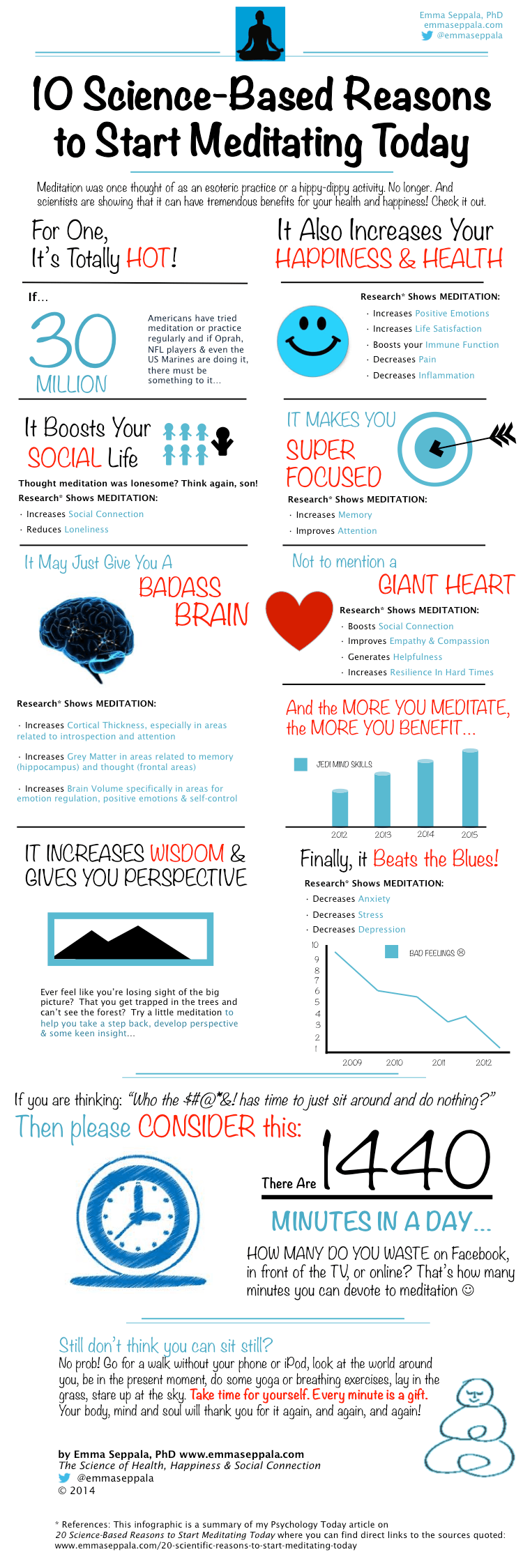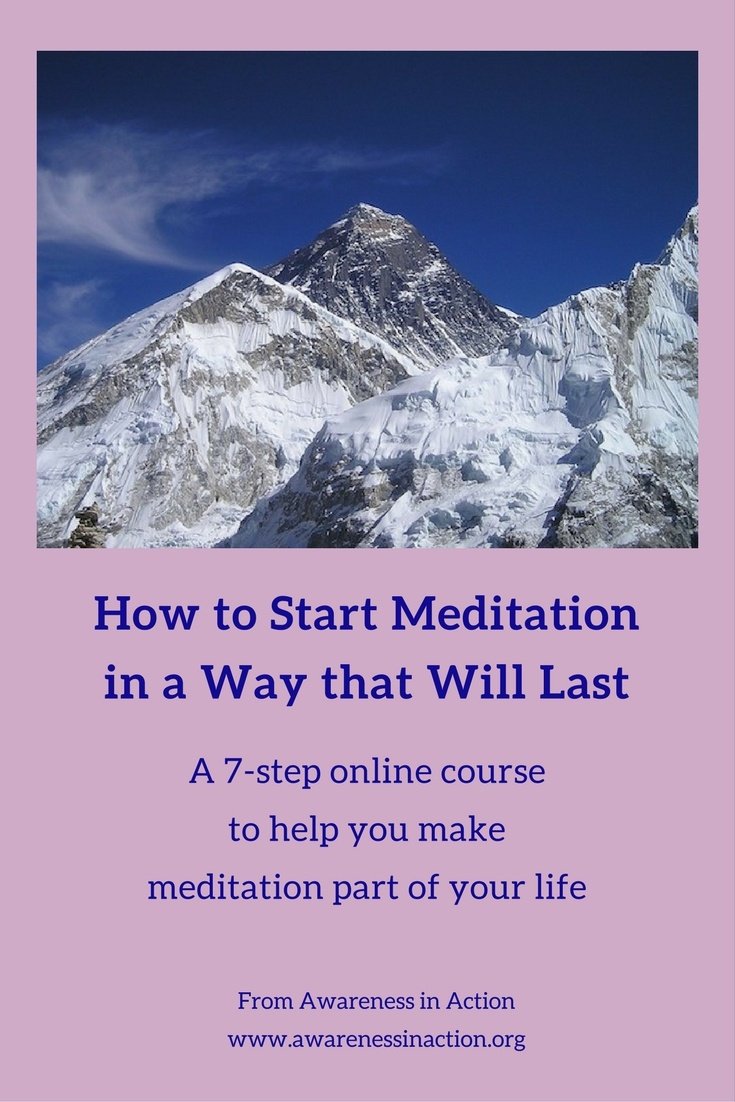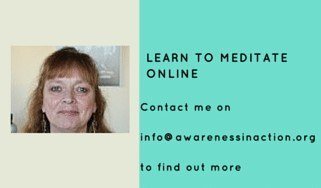
Meditation: five reasons why it can be hard and how to overcome them
When you started with meditation did you think that within a week or two you would immediately be feeling the benefits only to find that it is harder than you thought? Meditation itself is quite easy to learn but getting used to doing it regularly can be quite a challenge. If you learn meditation by attending a course then you have the support of weekly meetings to get your routine together but once the course ends, and you are on your own, it can be a different story.
None of this is surprising when you think how hard it is to learn anything new. Getting into a rhythm of regular exercise, or learning a language, or practicing a musical instrument can all be frustrating at times. It helps to know why we can find it hard to make meditation part of lives because then we can see what to do about it.
1. We don’t have the habit of meditation
Even though meditation has been around in the west now for a while, it is still something that only a minority engage in. It’s quite new to most of us—we didn’t learn it in school, most likely our parents did not do it and maybe most of our friends and family don’t meditate either. We’re reaching out to something new and that is rarely easy.
Add to that the fact that the brain loves habits as a way of conserving energy and has no way to tell the difference between a habit that is good for us and one that is not. Making the connections in the brain to set up a new habit is a process which takes time, because given the choice our brains will fall back into familiar patterns of behaviour.
2. Distraction
One of our most enduring habits is distraction. The Harvard study carried out in 2010 by Gilbert and Killingsworth showed that for 46.9% of our waking hours we are thinking about something different from what we are doing and that on balance, it does not make us happy. This is how we can go through so many of activities on a kind of autopilot—going through the motions with our attention elsewhere. In meditation we bring our mind into focus through paying attention in the present moment—whenever our attention wanders away we just gently bring it back. If we can learn to manage our distracting urges, rather than give into them, then we have the possibility to of being more intentional about what we say and do. This will help to increase our dependability, improve our relationships and raise our performance.
3.We are more into doing than being
 Research carried out in 2014 showed that most people do not like being left alone with their thoughts and that some were even prepared to give themselves mild electric shocks in order to have something to do. We are so used to being busy—both in terms of activity as well as everything that goes on in our minds—that we find it very hard to simply be with ourselves.
Research carried out in 2014 showed that most people do not like being left alone with their thoughts and that some were even prepared to give themselves mild electric shocks in order to have something to do. We are so used to being busy—both in terms of activity as well as everything that goes on in our minds—that we find it very hard to simply be with ourselves.
When we sit down to meditate then we are doing something that we are not used to doing, that cuts across our habitual distraction and involves us sitting quietly with our own minds. Is it any wonder that we might find that we would prefer to do something else?
 4. The choices we make
4. The choices we make
Of course we are all busy with many demands on our time but it is the choices we make with the time we do have available that is critical for us in establishing meditation as a habit. Although we say we have no time to meditate we do tend to find time to check FB, the news, watch a bit of TV and perhaps enjoy a glass of wine. There is nothing wrong with any of this but if we find that meditation helps us then we do need to look at our choices and see how and where it is possible to find time for it.
The trouble is that inspired by our first experiences of meditation we tend to make over-ambitious plans for our meditation routine and then get disappointed when we cannot keep to it. The trick is to start small—maybe 5 minutes a day—but to try and do it at least five times a week. That way we are making room for our new habit and building it into our routine.
Finding a trigger for meditation is another useful strategy. Perhaps we want to do our session in the morning after we have showered and dressed—so showering becomes the trigger for meditation. I have a client who lays out a tray for tea and then does her five minutes while it is brewing. Drinking the tea is her reward for meditating—because, yes, giving ourselves a small reward for building our new habit helps to make it routine.
5. Uneasiness with meditation
One of the subtler reasons we find meditation challenging can be that it makes us a bit uneasy. We’ve already talked about how hard it can be to sit in a room doing nothing, and how we love to keep busy. With meditation we learn to be with our minds as they are without judgement, letting go of our resistance to whatever arises. Without the usual defence mechanism of our distractions we can taste the delicate balance of our lives and sense our fragility in the scheme of things. Although we want the benefits that meditation can bring, there can be times when it feels as if in trying to bring them about we may lose our familiar preoccupations that remind us of who we believe ourselves to be.
So what can we do?
Don’t get too critical about how you are meditating—the chances are you are doing just fine. A question I like to ask in a meditation workshop is, ‘Who feels that everyone else is doing it right and you are the only one struggling?’ Most times almost everyone’s hand will go up. We tell ourselves all kinds of stories about how we are not meditating in the right way, and that our session was a waste of time because we had lots of thoughts and distraction. One thing I was always taught as I learned to meditate is that there is no such thing as a bad meditation—meditation is just what happens.
Making a welcoming place in your home for meditation will help with this. Find a spot that works for you and make it cosy and accessible, so that when you have that 5 minutes for your session then you know where to go. Maybe have a special cushion or shawl that helps you to settle and feel comfortable.
Don’t feel that you always need to do your session alone. You can find a local meditation group, or maybe pair up with someone else you know who is trying to meditate. You don’t need to meet up for every session but you could share schedules and things that work over a skype call. Having someone to share with really helps to overcome resistance.
Don’t get too precious about your meditation—try to find lots of short moments throughout the day when you can just do a few moments of meditation. I call these Stop Moments and you can do them anywhere—waiting in a queue, on a bus or train, while waiting at a red traffic light or as you take your first sip of coffee. Taking many short Stop Moments helps to break through distraction and is another tool in building habits.
Taking time to allow yourself to experience the benefits of meditation is perhaps the best way of ensuring that you will want to find a way to continue. This infogram from Emma Seppala gives a great overview. Take time to become familiar with the benefits as they are described and focus on the ones that speak to you. You might not feel all of these every day but if you sit long enough you will begin to experience a difference that will make you want to keep practicing. Remember that neuroscientific research into the effects of mediation on the brain shows a positive change after only eight weeks of practice.
If you are wanting to begin with meditation and need some support, you might find this practical online course helpful. It is available from Awareness in Action at any time – you can sign up whenever you wish.
Find out more here
If you are looking for personal guidance and coaching about your meditation practice contact me for details.




